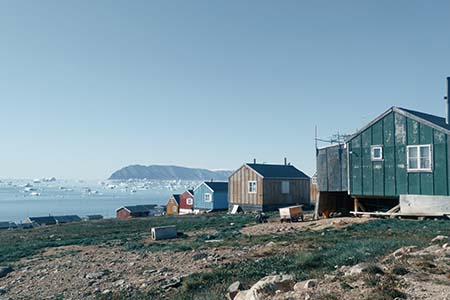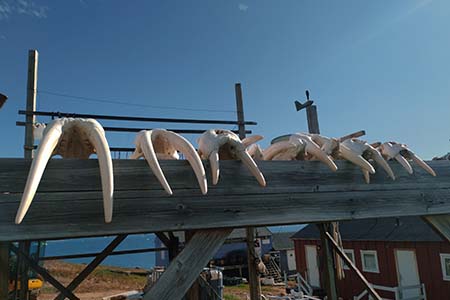Apostolos Tsiouvalas is a PhD fellow at the Norwegian Centre for the Law of the Sea, Faculty of Law, UiT The Arctic University of Norway, and his project “Sovereignty and Territoriality in the Seascape: from Inertia to Kinesis” is critically exploring Law of the Sea’s understanding of motion in the world’s oceans and seeks to revisit it in light of Arctic Indigenous communities’ legal-spatial thinking. With the ATTR Mobility Grant, Apostolos managed to travel to Avanersuaq, North Greenland over the summer 2022 and engage in empirical research with Inughuit hunters and fishers.
International Law and Indigenous Studies
Since my undergraduate studies, I have been educated and trained as a lawyer, while I also completed an LLM Degree in Polar Law. After I moved to Tromsø, my interest in Indigenous studies emerged and in June 2020 I obtained an MPhil in Indigenous Studies from UiT. In my current work, I am highly interested in exploring Indigenous communities’ own understanding of law and examining what Western legal thought can learn from Indigenous legal systems. The ATTR grant gave me the opportunity to apply my theoretical knowledge in the field and travel to the high north of Greenland in order to observe and learn the local communities’ legal understanding of ‘motion’ in the oceans, which is the topic of my ongoing PhD dissertation.
Motion in Law of the Sea

The scope of my PhD thesis has resulted from an overall observed bias that international law of the sea narrates territory in a relatively static and fragmented way determined by sovereign borders. Yet, the outset of the twenty-first century marked a period characterized by an increasingly ‘mobile’ re-conceptualization of the world, largely pushed forward by the rapid development of technology, access to popular media, and emerging changes in nature. Covering over 70% of the planet’s surface, the oceans have probably been the most exposed terrain to ‘motion’, dominating mainstream narratives and becoming a symbol of (climate) change and ever-increasing mobility patterns across the planet’s different ecosystems. ‘Motion’ however remains one of the less discussed concepts in jurisprudence and has been predominantly treated by Western legal thought as a non-philosophical category, best left to physics, and thus reduced to mathematic observations, and dislocation of masses among sovereign borders.
Against this background, this PhD project is organized into two main parts: It first seeks to expose the limits of the existing law of the sea framework to regulate motion in the world’s oceans in light of ongoing anthropogenic challenges and pursue a genealogical reading to trace the epistemological foundations and ontological underpinnings that inform law of the sea’s current understanding of motion.
Subsequently, to investigate whether international law of the sea could move towards an alternative conceptualization of motion, the project is tracing lessons from Indigenous legal orders that do not spring from the same theoretical point of departure than that of legal modernity that modelled Euro-American legal thought and may thus include alternative conceptions of spatial thinking.

Value of the Fieldwork for my Thesis
The ATTR Research Grant generously supported my fieldwork’s travel and accommodation costs to Qaanaaq, North Greenland, where I engaged in empirical research with the Inughuit people, the northernmost group of Inuit habiting the northern part of Greenland, Avanersuaq.
By looking at how ‘motion’ is reflected in the hunting practices and customary legal orders of these communities, I learned about the Inughuit conceptualization of motion in space that diverges from the traditional sovereign approach of states to marine space.
In the field, I realized that being mobile in the sea/sea-ice for the Inughuit people is a way of being and a core cultural practice connected to the animals’ movement. It further has a more-than-human dimension and is largely related to the communities’ welfare and food security.
Way forward
Extrapolating principles of Inughuit philosophy of ‘motion’ may be useful to theorize a different understanding of ‘motion’ for law of the sea that decouples from its traditional linear conceptualization and provide a guiding ethos for Western legal thinking to not merely halt nature’s inherent inclination toward motion, but, conversely, embrace it and facilitate it.
Currently, I have been analyzing the empirical research’s findings and trying to distill theoretical insights valuable for my thesis. The project will be completed in October 2024 when my dissertation is to be submitted.
